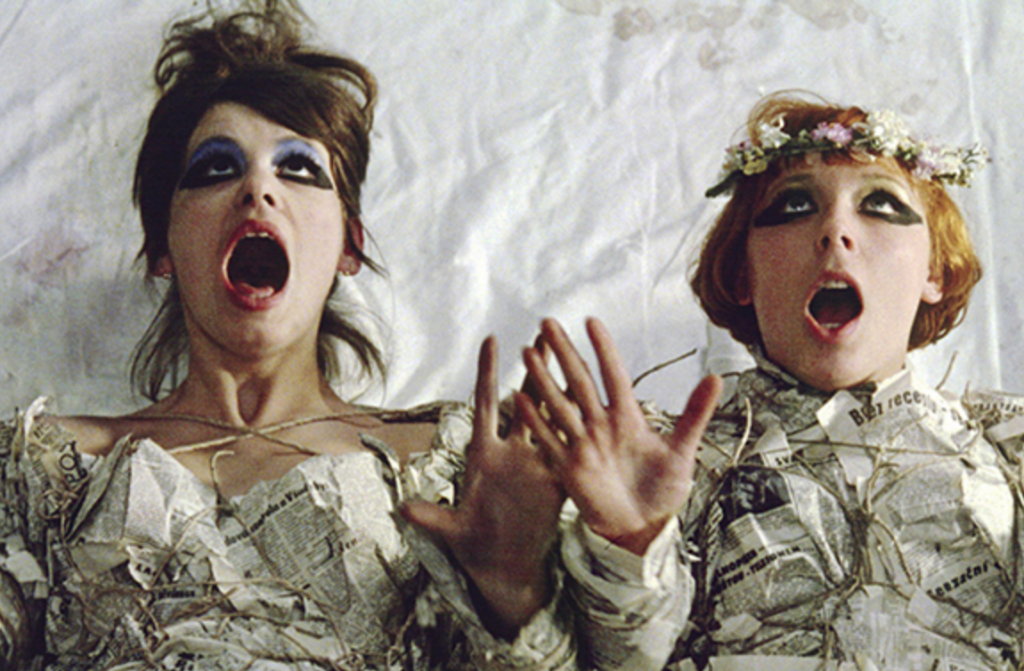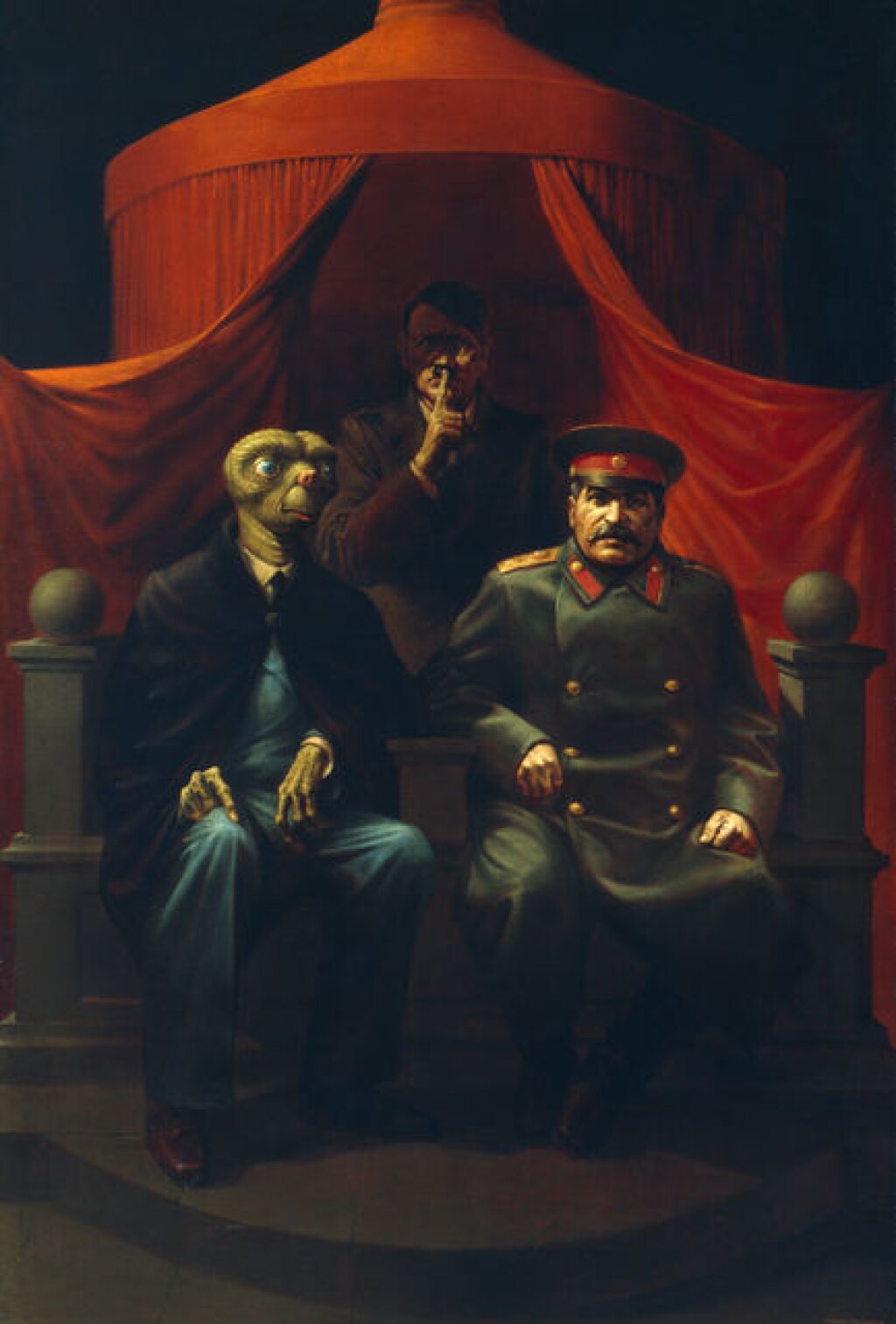The Jordan Center stands with all the people of Ukraine, Russia, and the rest of the world who oppose the Russian invasion of Ukraine. See our statement here.
This post features a Judges' Choice entry in the Jordan Center Blog's third annual Graduate Student Essay Competition.
Elena Kohn holds an MA in Russian, East European and Eurasian Studies with a Portfolio in Women’s and Gender Studies at the University of Texas at Austin.
Although Czech director Věra Chytilová’s 1966 surrealist film, Daisies [Sedmikrásky], predated the Prague Spring and the Soviet invasion of Czechoslovakia, it ironically highlighted a destruction that, however brutal, did not come from war. The two women in the film ponder their existence while behaving exactly as they please with no concern for the world. The hyper-sexual way they interact with their surroundings complements their constant declarations that they are “spoiled.” They use their feminine wiles to escape employment and responsibility, taking advantage of older men who attempt to take advantage of them.
The women’s flighty and indulgent lives on screen are set to the sound of a ticking clock, alternating with similar noises like a typewriter, a pendulum, turning gears, a train clacking along the tracks, and water flowing. This sonic pairing juxtaposes the characters’ carelessness with the ever-present threat of running out of time, portending death and connecting the film to its historical context. The film uses motifs of sex and death to draw attention to the women’s youth, and the implications that youth has for revolution and wartime. The concept of youth often indicates a responsibility for revolution and an expectation of weathering war. Society often considers youthful behavior anathema to traditional values, both in a negative sense—as immature—as well as in a positive sense—as a tool for promoting social change.
The women are referred to as Marie #1 and Marie #2, prompting the viewer to reflect on tensions within conceptions of individualism. The Maries are constantly bored, looking to find “something happening,” and constantly consuming—food, entertainment, men. The film’s palette alternates between black and white, when they go into the outside world to seek something to do, and color, when they eat extravagantly, lie around, or frolic in their underwear. The film’s circular plot, like the sound that accompanies it, points to the constant passing of time and the inevitability death. The first shot of the film shows the two women in bathing suits and continues into a sequence in which an old man takes them out to dinner and then onto a train—only for the women to leave him. Multiple iterations of this same sequence recur throughout the film, beginning each time with the same bathing suit shot but progressing slightly differently, either with a different color scheme or added details, like sunglasses.
As young women, the heroines are able to skate through their lives, barely present, giggling at and ignoring anything that does not hold their interest. The men that they appear to use for various ends, always under false names, become infatuated with them—but they do not care. “I may have fallen in love with you,” one man says, only to hear in response: “Is there any food here?” The women’s sexualities are inextricably entwined with their behavior, affecting not just what they can, but also what they attempt to get away with. In their constant (ironic) complaints that they are “spoiled,” they use the Czech word zkaženy. In translation, zkaženy represents a double entendre of sorts, in that it refers to both “spoiled” with respect to rotten food as well as moral corruption. When the Maries steal five crowns from a friend, one calls the other a thief. The response is, “I’m more spoiled than you,” which shifts the blame for her laissez-faire attitude from youth and femininity to a deeper-seated corruption. In a similar vein, one of the women later insists that the other smoke a cigarette. The latter protests that smoking is “immoral,” for which she again uses the same word, zkaženy. The broad usage of the term implies a connection between the innocence of spoiled youth and the corruption of adulthood.
The main challenges the two women face are the demands of morality, the search for meaning, and the pitfalls of youth. Their youth propels them into a double-edged ontological crisis: combined with their femininity, it seems to be the only thing giving their lives meaning; but, as one of the sources of their profoundly inconsiderate behavior, youth simultaneously leaves them unfulfilled. Often enough, youth and femininity enable the women to satisfy short-term desires for food and entertainment—as, for example, when they are able to get older men to take them out to dinner. Yet this “accomplishment” leaves them unsatisfied and complaining of boredom and hunger. Even as they cling to youth and delight in its ability to get them what they want, the film’s ticking clock portends the Maries’ eventual downfall. The plot moves cyclically from sequences of the women going out and having fun, to sequences in which they sit at home and contemplate their existence. The ticking clock and similar noises not only represent their quickly disappearing youth, but go even further to portend death, which the women ponder throughout the film as they repeatedly languish in boredom.
The characters' apathy toward the world around them is clear from the low regard in which they hold both others and themselves. The cheerful springtime setting, with its green apples and frenetic activity, quickly becomes morose as one of the women tries to kill herself by leaving the gas on, an event that evokes Eve’s fall from Eden. The brunette Marie enters and asks the blonde who will pay the gas meter. The would-be suicide’s response is: “The dead don’t give a damn.” Seemingly desperate to hold onto youth, the women are obsessed with death, which overshadows even their most carefree activities.
The Maries’ apparently detached and ironic conversations reflect this obsession: “Is there something happening?” one woman asks, only to be told, “Yeah, like when someone has ceased to exist.” Their concern with death is a natural side effect of the insecurity they appear to feel about wasting their lives. “You have no employment, there’s no evidence of you,” one Marie snaps at the other. Later, they are feasting—as they do throughout the movie—leaving a trail of corn husks behind them. “You see?” One of them says, gesturing to the husks. “We do exist after all.” Their very attempts to find “something happening” reflect their concern about a frighteningly empty future. “What will happen to us?” They ask. “We lack evidence of anything.”
Ultimately, the Maries pay a high price for their behavior. They discover an unattended banquet, and promptly trash it. As they lay waste to the food and the banquet hall, they swing from a chandelier and fall into a river. They cry out: “Help, we’re drowning, we’re calling for help because we’re spoiled—but we don’t want to be spoiled anymore!” That the women’s fate is a direct consequence of their bad behavior is an indictment of their blasé attitude and the ease with which they cheat life.
Yet Chytilová also critiques the society that produced them. After all, their vices—from their gluttony, to their crippling fear of death, to their obsession with sexuality and youth—are values directly inherited from the world that created them. Chytilová anticipates many of the anxieties Czech society experienced following the Prague Spring and its brutal suppression by the Soviet government. Her representation and critique of Czech society was so acute that the film was banned for a time. Questions of individualism, waste, superfluousness, apathy, and death, at the forefront of Chytilová's exploration of social conditions in mid-century Czechoslovakia, remain eminently relevant not only to the country's “communist” period, but to critiques of the modern world and contemporary capitalism.



